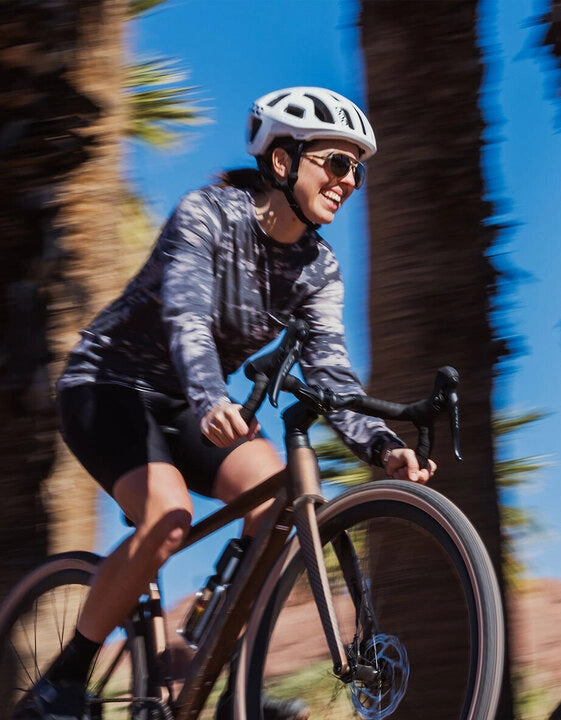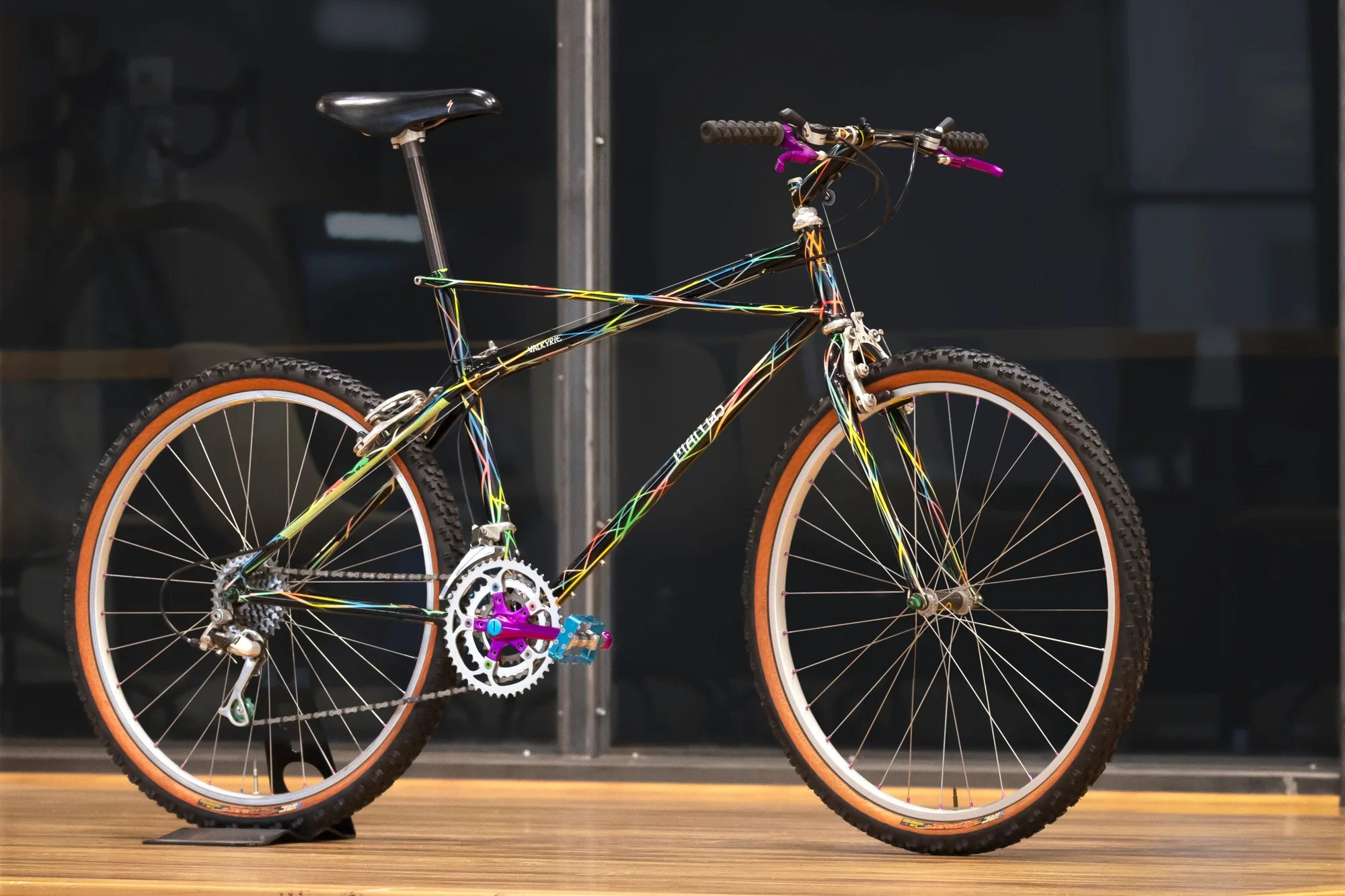I enjoy foreign cars, imported beer, and movies with subtitles. But when it comes to bikes, I like to ride domestic. I think every bike enthusiast should own an American-made bike at some point in their life.
Many American framebuilders have distinguished themselves, but who are the great legends? And who are the brightest new stars? To find out, I perused our vintage bike museum, checked out our bike inventory, and got schooled by the head honcho of The Radavist, John Watson. Here are my picks.
|Great American framebuilding legends
Albert Eisentraut
 A 1994 Eisentraut road bike for sale at The Pro's Closet.
A 1994 Eisentraut road bike for sale at The Pro's Closet.
“If you trace it back, Eisentraut was the tree branch that many California builders stemmed from,” said Watson. The godfather of modern American framebuilding built his first frame in 1959 using a frame jig he machined himself. He became known for building his own style of bikes, rather than mimicking European designs. He taught his craft to future legends Joe Breeze, Bruce Gordon, Skip Hujsak, Mark Nobilette, and Bill Stevenson.
Ben Serotta
![]() The 1988 Serotta-built Huffy 7-Eleven team bike.
The 1988 Serotta-built Huffy 7-Eleven team bike.
The legendary American 7-Eleven team raced on Murray and Huffy bikes but these bikes were actually built by Ben Serotta. An essential figure in the rise of American road cycling, Serotta became the dominant builder of high-performance racing frames through the ’80s and early ’90s, building bikes for the American Olympic team and another legendary American team, Coors Light.
Read about Davis Phinney’s 1984 Olympic Murray Serotta and Scott Moninger’s 1990 Team Coors Light Serotta.
Watch our video with Scott Moninger and his Coors Light Serotta Colorado.
Charlie Cunningham
 1983 #29 Cunningham | Photo: John Watson
1983 #29 Cunningham | Photo: John Watson
“The parts we’re used to now didn’t exist back then. Guys like Cunningham made everything themselves. They were inventing it,” said Watson. Cunningham pioneered compact frame geometry, sloping top tubes, wider rear hub spacing, zero-dish rear wheels, narrower Q-factors, and even 1x drivetrains. His development of lightweight, welded, and heat-treated aluminum frames paved the way for brands like Cannondale to bring aluminum to the forefront of cycling technology.
Read about our 1974 Cunningham Alan or check out our 1988 Cunningham Racer #22.
Chris Chance
 1990 Fat Chance Yo Eddy.
1990 Fat Chance Yo Eddy.
Chris Chance and Fat City Cycles represent the genesis of East Coast mountain biking. When he built the first Fat Chance mountain bike in 1982, there was nothing else like it. West Coast bikes had ultra-long chain stays, slack angles, and low bottom brackets for Repack-style riding. But Chance bucked the trend with buzz-cut chain stays, upright angles, and high bottom brackets made for clearing the stumps, roots, and boulders of New England's trails.
Read about our 1990 Fat Chance Yo Eddy.
Watch our video meeting Chris Chance.
Joe Breeze
 The 1978 Breezer Series I.
The 1978 Breezer Series I.
Breeze is credited with building the first modern mountain bike, the Breezer #1 in 1977. That bike is now in the collection of the Smithsonian Institution’s National Museum of American History, but Breeze built nine more Series I Breezers, one of which resides in our own vintage bike museum. “Everyone likes to talk about people like Gary Fisher and Keith Bontrager, but Joe [Breeze] paved the way for mountain bike production,” said Watson.
Read about our 1978 Breezer Series I.
Watch our video meeting Joe Breeze.
Mark DiNucci
 One of DiNucci's recent creations, a 2018 Classic Road | Photo: John Watson
One of DiNucci's recent creations, a 2018 Classic Road | Photo: John Watson
As an engineer for Specialized, Dinucci created the original steel Allez, one of the most coveted racing bikes of the ‘80s and ’90s. DiNucci sourced higher quality tubing and lugs from Japan, setting his bikes apart. This quest for quality led to the creation of Specialized’s S-Works division. While many American brands struggled for recognition overseas, DiNucci’s bikes were highly regarded as they went on to win mountain bike world championships and stages of the Tour de France.
Tom Ritchey
 1983 Ritchey "Faux Lug" Competition
1983 Ritchey "Faux Lug" Competition
While Breeze built the first mountain bike, his friend Tom Ritchey became mountain biking’s first production framebuilder, bringing numerous innovations to frame and component design. “I personally feel his fork design influenced the design of the uni-crown fork, which is still in production today,” said Watson. Ritchey was also a pioneer of fillet brazing and brazed over 1,000 bikes in his first three years of production.
Read about our 1976 Ritchey road bike which Ritchey built at only 19 years old.
Honorable mentions:
Bruce Gordon (“The OG gravel god.”)
Chris Igleheart (“Designer of the segmented fork. That fork is still used by numerous builders.”)
Richard Sachs
Mario Confente
Independent Fabrication
JP Weigle (“A true constructor and artisan. Weigle is still machining everything himself.”)
Litespeed / the Lynskey family
Moots / Kent Eriksen
Seven Cycles
Waterford Precision Cycles
The latest American framebuilding stars
Firefly Bicycles
 John's rat rod Firefly 2.0 Chubby Road | Photo: John Watson
John's rat rod Firefly 2.0 Chubby Road | Photo: John Watson
“Firefly (in Boston) came from Indy Fab, which came from Fat City. They’re stunning examples of deep custom bike nerdery. I don’t think No. 22’s finishing program would exist without Firefly. Plus, they’re doing awesome 3D printed stuff. In terms of titanium frame builders, I think they’re doing some of the most advanced work in the U.S,” said Watson.
Mosaic Cycles
 Mosaic GS1 All-Road | Photo: John Watson
Mosaic GS1 All-Road | Photo: John Watson
Mosaic Cycles produces bespoke titanium and steel bicycles in Boulder, Colorado. Mosaic's sister company, Spectrum Paint & Powder Works, provides many options for vivid custom paint, and also paints many frames for other handbuilt brands.
No. 22 Bicycle Company
 No. 22 Aurora Disc | Photo: John Watson
No. 22 Aurora Disc | Photo: John Watson
No 22 uses the old Serotta facility in Johnstown, New York. They build titanium frames with a focus on contemporary finishes to showcase the beauty of raw and anodized titanium.
Sklar Bikes
 Sklar Disc Dirty Roadie | Photo: John Watson
Sklar Disc Dirty Roadie | Photo: John Watson
Sklar bikes stand out with their distinctive curved top tubes. Each bike is custom built to order, one at a time by Adam Sklar in Bozeman, Montana. Their beauty and craftsmanship has made them instant classics. “I own a Sklar 29+ rigid mountain bike myself,” said Watson.
Speedvagen / The Vanilla Workshop
 Speedvagen Ready-Made Disc OG | Photo: John Watson
Speedvagen Ready-Made Disc OG | Photo: John Watson
Speedvagen bikes are produced in small batches by The Vanilla Workshop based out of Portland, Oregon. All of its bikes are built out of steel with classic lines and plenty of custom details like machined dropouts.
Honorable mentions:
Argonaut Cycles
Allied Cycle Works
Black Sheep Bikes
Breadwinner Cycles
Myth Cycles (“Steel full suspension!”)
Reeb Cycles
Final thoughts
Choosing the biggest legends or brightest stars might be a matter of taste or exposure. Since Watson has attended every edition of the North American Handmade Bike Show since 2008, he had great perspective on the difference between a great framebuilder and a legendary craftsperson.
“I think bikes stand out once you start getting into deep custom frames. The framebuilders who are pushing the envelope are doing what Cunningham was doing back in the day. They’re machining everything in their shop. Making unique, handmade parts. There are very few builders doing that. It’s the difference between artisan and production frames. Of course, there’s space for both. Not everyone wants or needs something deep custom.”
I’ve just scratched the surface with my short list. And chances are, this list won’t match your list. I can't fit every builder here, so who did I miss? Let me know in the comments who you think the greatest American framebuilders are, past or present!
|
























